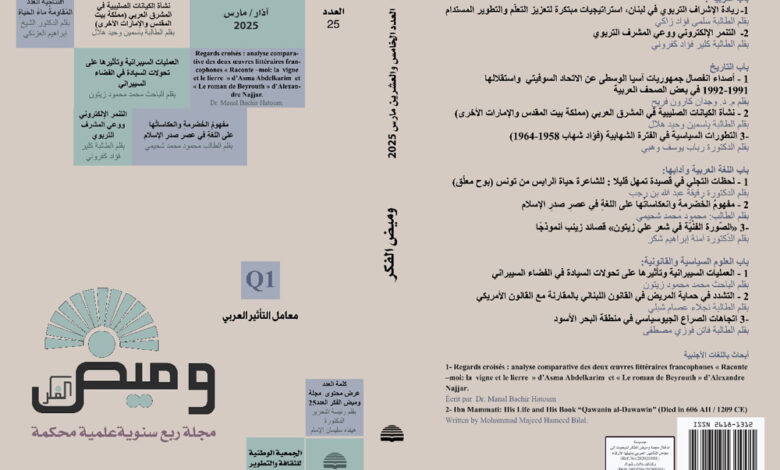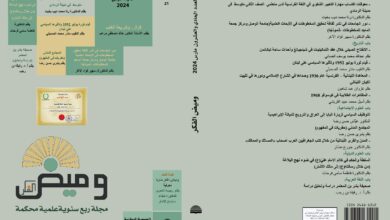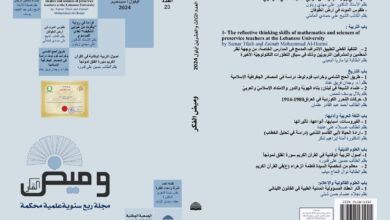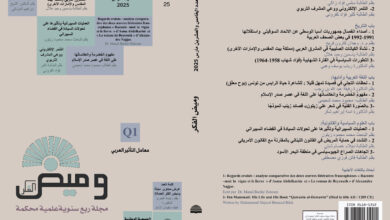Ibn Mammati: His Life and His Book “Qawanin al-Dawawin” (Died in 606 AH / 1209 CE)

عنوان البحث: Ibn Mammati: His Life and His Book "Qawanin al-Dawawin" (Died in 606 AH / 1209 CE)
اسم الكاتب: Mohammad Majeed Hameed Bilal
تاريخ النشر: 25/03/2025
اسم المجلة: مجلة وميض الفكر
عدد المجلة: 25
تحميل البحث بصيغة PDF
Ibn Mammati: His Life and His Book “Qawanin al-Dawawin” (Died in 606 AH / 1209 CE)
ابن مماتي: حياته وكتابه “قوانين الدواوين” (ت 606هـ/1209م)
Written by: Mohammad Majeed Hameed Bilal
Directorate General of Education in Al-Najaf Al-Ashraf
بقلم الدكتور محمد مجيد حميد بلال
المديرية العامة للتربية / في النجف الأشرف
mbusj140@gmail.com
Date of receipt: 4/ 2/2025 Date of acceptance: 17/3/2025 Date of publication: 3/25/2025
Abstract
Christian historians in Islamic Egypt were not interested in general history only, as did John al-Naqyusi and Said bin Tariq, or in the history of biographies and biographies, as did Sawiris bin al-Muqaffa in his book “The History of the Patriarchs of Alexandria”. However, they excelled in another type of historical writing that is no less important than the previous two types, which is writing in systems, civilization and plans; They wrote about government systems, financial laws, management methods, agricultural affairs, and surveying engineering(1), as did Ibn Mammati in his book ” Qawānīn al-Dawāwīn “. As for the plans(2) and the history of churches and monasteries, another historian known as Abu al-Makarem bin Gerges bin Masoud took care of them in his book “The History of the Churches and Monasteries of Egypt”. These two books have their own importance in the study of Islamic systems and civilization, especially in Egypt during the transition period from Fatimid rule to Ayyubid rule, specifically during the twelfth century AD (sixth AH), as they are indispensable sources for the history of this period. In this study, the book “Laws of Divans” by Ibn Mammati is studied and demonstrated its importance as a source of Islamic history and the history of Egypt in this period. The research included three demands, dealing with the first requirement: his name, lineage and birth. In it, we studied his culture, the most important features of his personality, his writings, and the definition of the book “Laws of Divans”. As for the second section, the approach of Ibn Mammati in the book “Laws of Divans” was studied analytically, while the third topic focused on the importance of the book “Laws of Divans” as a source of Islamic civilization and systems.
Keywords: Ibn Mammati , Egypt, ministry, historical method, divans, Islamic systems, ecclesiastical history.
المخلص
يُعَدُّ العصر الأيوبي من الفترات التي شهدت تطورات إدارية وتنظيمية كبيرة، وكان لعدد من الكُتّاب دور بارز في هذه النهضة، ومن بينهم القاضي الأسعد بن ممّاتي، الذي عُرف بكتابه “قوانين الدواوين”، والذي يُعدّ من أهم المصادر في دراسة الإدارة والمالية في الدولة الأيوبية.
ويعد الأسعد أبو المظفر إبراهيم بن علي بن ممّاتي، وُلد في القرن السادس الهجري ونشأ في بيئة ثقافية وإدارية، حيث كان والده يعمل كاتبًا في الدولة الفاطمية ثم الأيوبية.
وقد شغل ابن مماتي مناصب رفيعة في الدولة الأيوبية، حيث تولّى إدارة الدواوين المالية، وكان مسؤولًا عن تنظيم الموارد المالية للدولة، الأمر الذي جعله مطلعًا على أوضاع البلاد الإدارية والاقتصادية.
يُعدُّ كتاب “قوانين الدواوين” من أهم مؤلفات ابن ممّاتي، وهو كتاب إداري يُقدم صورة دقيقة عن النظام المالي والإداري في عصر الدولة الأيوبية. ويُعد هذا الكتاب مصدراً مهمًا لدراسة تطور الإدارة في مصر. ظل كتاب “قوانين الدواوين” مصدرًا أساسيًا للمؤرخين والباحثين في مجال الإدارة والاقتصاد في العصور الإسلامية، كما أثر ابن ممّاتي في تطوير نظم الدواوين، حيث استمر تأثيره في العصور اللاحقة، خاصة في الدولة المملوكية.
وتضمن البحث ثلاث مطالب، تناول المطلب الأول: أسمه ونسبه ومولده. ودرسنا فيه ثقافته واهم ملامح شخصيته ومؤلفاته والتعريف بكتاب “قوانين الدواوين. أما المطلب الثاني تناول منهج ابن مماتي في كتاب قوانين الدواوين دراسة تحليلية، فيحين ركز المطلب الثالث على أهمية كتاب “قوانين الدواوين” بوصفه مصدراً من مصادر الحضارة والنظم الإسلامية.
الكلمات المفتاحية: ابن مماتي، مصر، الوزارة، المنهج التاريخي، الدواوين، النظم الإسلامية، التاريخ الكنيسي.




